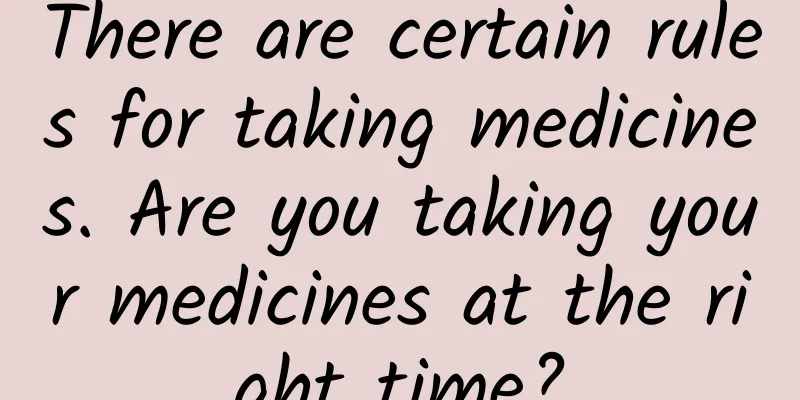There are certain rules for taking medicines. Are you taking your medicines at the right time?

|
In daily life, taking medicine is an important means for us to deal with various diseases. However, many people may only pay attention to the dosage and frequency of the medicine when taking it, but ignore the importance of the time of taking the medicine. In fact, the correct time of taking medicine can not only improve the effect of the medicine, but also reduce side effects and make the treatment smoother. So, is your medication time correct? The importance of medication timing The absorption, distribution, metabolism and excretion of drugs in the body are all affected by the biological clock. The physiological state, metabolic rate and drug absorption rate of the human body will change at different time periods. Therefore, choosing the right time to take medicine can make the drug play the best therapeutic effect in the body while reducing possible adverse reactions. How to determine the best time to take medication 1. Follow your doctor’s advice We should follow the doctor's advice and take the medicine according to the doctor's instructions. The doctor will give the most appropriate medication time based on the patient's specific situation and the characteristics of the medicine. 2. Refer to the drug instructions Drug instructions usually provide detailed instructions and suggestions for medication, including the time to take the medicine. Before taking the medicine, we should read the drug instructions carefully to understand the usage and dosage of the medicine, and take the medicine according to the recommendations in the instructions. 3. Consult a professional pharmacist If you have any questions or are unsure about the time to take the medicine, you can consult a professional pharmacist. The pharmacist will give professional advice and guidance based on the characteristics of the medicine and the patient's condition. Best time to take common medications 1. Antidiabetic drugs Sulfonylurea hypoglycemic drugs, such as glibenclamide and gliclazide, should be taken half an hour before meals. Non-sulfonylurea insulin secretagogues, such as repaglinide and nateglinide, should be taken orally 5-20 minutes before meals. Acarbose and voglibose should be chewed with the first bite of food. Metformin is irritating to the gastrointestinal tract and should be taken during or after meals. 2. Antihypertensive drugs Long-acting antihypertensive drugs, such as amlodipine, losartan, etc., are usually recommended to be taken between 7 and 8 in the morning. Short-acting antihypertensive drugs, such as metoprolol tartrate tablets and nifedipine tablets, need to be taken twice a day, at 7-8 am and 2-4 pm. 3. Thyroid hormone drugs It is generally recommended to take it half an hour before breakfast, because the stomach is more active at this time, which is conducive to the absorption of the drug. 4. Osteoporosis drugs The best time to take medication is in the morning after waking up, which helps increase the absorption and utilization of the medication. 5. Heart disease medicine For heart medications such as anti-anginal drugs, the best time to take them is usually in the morning before getting out of bed, which helps prevent daytime angina attacks. 6. Digestive aids Such as pepsin, pancreatin, etc. Usually taken about 10 minutes after a meal to help digestion. Stomachic medicine is recommended to be taken 10 minutes before a meal to help the absorption of the medicine. 7. Calcium The best time to supplement calcium is generally at the same time as eating, because gastric acid secretion increases at this time, which helps the absorption of calcium. 8. Vitamins For example, vitamin B2, vitamin A, vitamin D, etc., are usually suitable to be taken between meals, which helps the absorption and utilization of the drugs. 9. Antibiotics Such as amoxicillin, cefaclor, etc. Taking it after meals can reduce gastric irritation and increase the absorption rate of the drug. 10. Nonsteroidal anti-inflammatory drugs Such as aspirin, indomethacin, etc. Taking it after meals can reduce the irritation of the drug to the gastric mucosa. 11. Antacids Antacids are usually taken within 30 minutes to an hour after a meal to help neutralize stomach acid and relieve stomach discomfort. 12. Lipid-lowering drugs Such as simvastatin, pravastatin, etc. Cholesterol is mainly synthesized at night, so taking it before going to bed can better lower blood lipid levels. 13. Anti-allergy medicine Such as chlorpheniramine maleate, cetirizine tablets, etc., are usually taken half an hour before going to bed, which helps to relieve allergy symptoms at night. 14. Sedatives and hypnotics Such as lorazepam, estazolam tablets, zopiclone, etc. It is generally recommended to take it before bedtime to help improve sleep quality. How to follow the specific time to take medicine in daily life? There are many ways to fit your medication schedule into your daily routine. Here are some tips: 1. Develop a medication plan Create a medication schedule and post it somewhere obvious, such as on the refrigerator door, in the medicine cabinet, or by your bed, so you can always access it. 2. Set reminders Use the alarm function on your phone or electronic device to set a daily reminder to take your medication. Consider using a smart pill box, which can set a time to remind you to take your medication and automatically dispense it. 3. Drug classification management Classify medicines according to the time of daily use, use small medicine boxes or bottles with partitions to store them separately, and clearly mark the name, dosage and time of use of the medicine. The choice of medication time is crucial for both drug efficacy and physical health. We should pay attention to the time of taking medication, follow the doctor's advice, read the drug instructions carefully, and consult a professional pharmacist when necessary. Through a reasonable medication schedule, we can improve the therapeutic effect of the drug, reduce side effects, and promote physical recovery. Let us work together to choose the right time to take medication and add points to our health! Author: Bai Yunhe Chengde Third Hospital |
>>: What to do if you have ureteral stones? Do you know how to take care of it?
Recommend
What should I do if my girlfriend has her period?
For male friends who have girlfriends, they alway...
Does chest X-ray affect pregnancy preparation?
Chest X-ray is a relatively common examination it...
Is it normal to have a lot of white discharge after sex?
Marriage is the beginning of happy sexual interco...
The menstrual period is only two days
Menstruation is the normal physiological cycle of...
Lower abdominal pain on the fourth day of painless abortion
As society becomes more and more open, many peopl...
To protect your liver and avoid making mistakes, stop eating these 4 kinds of food!
Modern people work, study and play games every da...
How to control the diet of pregnant women with gestational diabetes
Diabetes is one of the more common diseases in li...
What to do about vulvar itching caused by bacterial vaginosis?
There are many types of vaginitis now, and bacter...
Where is the aorta located? What is aortic dissection?
Author: Guo Wei, Chief Physician, PLA General Hos...
More than 200 million people are affected, and the incidence rate in women is higher than that in men! How to prevent thyroid nodules?
In recent years, many people have thyroid nodules...
What is the normal pH value of vaginal discharge?
In our daily life, for female friends with abnorm...
What causes strong body odor?
A strong odor in the lower body mainly refers to ...
What to do if you have constipation and smelly farts during pregnancy
Women will always experience some changes during ...
What is the largest crater on the moon? Can you see a solar eclipse on the moon?
Regarding the solar eclipse that occurs on Earth,...
If your newborn has tears and pus, be careful of this congenital disease!
Newborn babies sometimes look very cute with tear...









